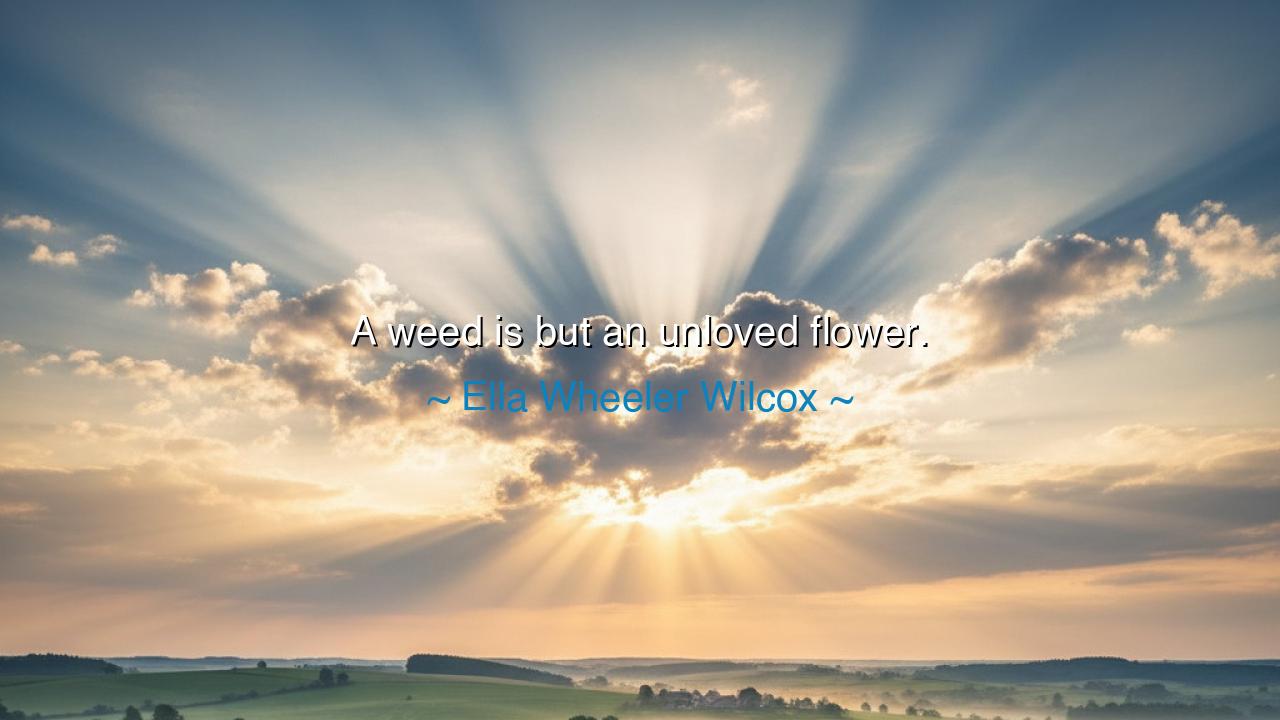
A weed is but an unloved flower.






In the garden of life, there are many souls—some cherished and nurtured, while others are often cast aside, deemed undesirable or unloved. Ella Wheeler Wilcox speaks to this profound truth when she says, "A weed is but an unloved flower." These words carry the wisdom of ages, a wisdom that transcends the narrow boundaries of how we classify and judge. In this single statement, she invites us to look beyond the surface, beyond labels, and see that what we often dismiss or reject may, in another light, be something of beauty and worth. The weed, which we so often uproot and cast aside, is merely a flower that has yet to find appreciation. It is a symbol of what lies hidden beneath the judgments of society and even within our own hearts—beauty waiting to be acknowledged.
The ancients understood this relationship between value and perception. The Greeks, with their reverence for nature, saw beauty not only in the most polished of forms but also in the wild and untamed. Homer, in his epic The Iliad, speaks of heroes who, though they may be seen as rough and untamed, are, in reality, full of virtue and greatness. In the same way, a weed is often seen as an outsider—unwanted, growing in the cracks and gaps of the garden, yet it carries the potential for something beautiful and valuable. The flower that grows wild may be the very symbol of life’s resilience, its ability to thrive in harsh conditions, unnoticed but steady. What one man dismisses, another may embrace as a treasure, for beauty lies not just in form, but in context and appreciation.
In the tradition of ancient Rome, Virgil wrote about the importance of the natural world in his work Georgics. He celebrated the earth and its produce, including plants that were both useful and wild. To the Romans, the wild was not something to be discarded but something to be understood and integrated into the balance of life. Weeds, in this sense, are not inherently bad; they are simply parts of a larger whole, misunderstood or overlooked by those who do not take the time to appreciate them. The Romans knew that the land, like human nature, was not black and white but a blend of complexity, where the untamed could often bring new understanding to the tended and carefully ordered.
Ella Wheeler Wilcox’s insight into the weed as an unloved flower speaks to the broader theme of acceptance and value. In ancient India, Buddhism teaches that all things have inherent value and potential, even the most overlooked aspects of life. The lotus flower, which grows from the mud and muck of the riverbed, is a symbol of spiritual awakening and purity. It begins in the muddy waters, where its beauty is hidden, much like the weed. The act of gardening, in this sense, becomes an act of recognition—the gardener’s role is not to simply nurture the flowers of acceptance and favor, but to see the value in all that grows, no matter how unkempt or wild. The gardener’s work is to cultivate understanding, to help the garden as a whole reach its highest potential, even if that means seeing beauty in the weeds.
The lesson in Wilcox’s words is one of perspective. In life, we often judge those around us based on preconceived notions or external appearances. Much like the gardener who uproots the weed without understanding its purpose, we too can be quick to dismiss those who do not fit the mold of what is considered beautiful, useful, or desirable. But what if, like the weed, these individuals, or aspects of life, hold hidden beauty or wisdom that we have yet to see? What if the weed is a flower in disguise, waiting to bloom once it is embraced and nurtured? Just as the gardener must pause before pulling the weed from the ground, we too must pause before we judge others, for beauty can often be found where we least expect it.
Take, for example, the story of Vincent van Gogh, whose work was not recognized during his lifetime but whose wild, often misunderstood paintings are now regarded as masterpieces. Van Gogh, in his pursuit of artistic expression, painted not just what was considered beautiful, but what he saw beneath the surface—the raw, untamed beauty of life, much like the weed that grows in the cracks of the earth. His sunflowers, vibrant and alive, are a perfect representation of what Wilcox speaks of: what was once dismissed or undervalued, is now seen as a thing of great worth. In the same way, we must learn to look beyond the surface, to see the hidden potential in people, places, and experiences.
The ultimate lesson, then, is one of awareness and compassion. To see the weed as an unloved flower is to open our hearts to the complexity of life, to embrace the untamed, the wild, and the imperfect. Life, like the garden, is not always neat and tidy, and often, the most profound lessons and the greatest beauty are found in the things we least expect. Just as a gardener nurtures all plants with care, we too must learn to care for the unseen, the misunderstood, and the marginalized, knowing that, given the right attention, they, too, can bloom into something extraordinary. In doing so, we create a world where all are seen, all are valued, and all have the potential to shine.






AAdministratorAdministrator
Welcome, honored guests. Please leave a comment, we will respond soon